

|
Mr. Henry Dashwood "By a former marriage, Mr. Henry Dashwood had one son: by his present lady, three daughters." When his old uncle, the elder Mr. Dashwood, dies and leaves his estate, Norland Park, to his nephew John, and great-nephew Harry, there is little left for Mr. Henry's second wife and daughters. "Mr. Dashwood's disappointment was at first severe; but his temper was cheerful and sanguine, and he might reasonably hope to live many years, and by living economically, lay by a considerable sum." How soon comes the ruin of our plans: "But the fortune, which had been so tardy in coming, was his only a twelvemonth. He survived his uncle no longer; and ten thousand pounds, including the late legacies, was all that remained for his widow and daughters." |
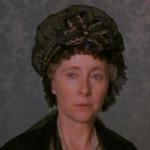
|
Mrs. Dashwood Mr. Dashwood's second wife who grieved long for her dearly departed husband but, "she is very stout and healthy, and hardly forty." When her stepson and daughter-in-law come to claim the estate Mrs. Dashwood feels the pressure from Fanny to move out all the more as she and her daughters have no where to go. "The indelicacy of " Fanny's "conduct was so much the greater, and to a woman in Mrs. Dashwood's situation, with only common feelings, must have been unpleasing; but in her mind there was a sense of honor so keen, a generosity so romantic, that any offense of the kind, by whomsoever given or received, was to her a source of immovable disgust." She would just as soon leave Norland at once but Elinor helps her to reconsider their homeless situation that "and her own tender love for all her three children" help her to bear Fanny just a little bit longer. |
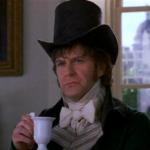
|
John Dashwood Mr. Dashwood's son by his former marriage, "a steady respectable young man" but "had not the strong feelings of the rest of the family." The estate of Norland Park is now wholly his own and secured to his little son Harry. His father asks him to do something to help his stepmother and sisters and "He was not an ill-disposed young man, unless to be rather cold-hearted and rather selfish is to be ill-disposed: but he was, in general, well respected; for he conducted himself with propriety in the discharge of his ordinary duties" He also has a nasty habit of allowing himself to be persuaded by his wife: " This argument was irresistible. He finally resolved that it would be absolutely unnecessary, if not highly indecorous, to do more for the widow and children of his father than such kind of neighbourly acts as his own wife pointed out." |
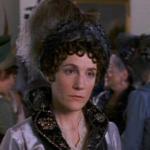
|
Fanny Dashwood John's wife "was a strong caricature of himself; more narrow-minded and selfish." A very uncaring creature: "No sooner was his father's funeral over than Mrs. John Dashwood, without sending notice of her intention to her mother-in-law, arrived with her child and their attendants. " She not only barges in on the widows grief but also invites her brother to stay at Norland Park! How rude! |
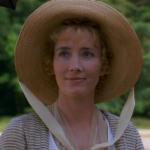
|
Elinor Dashwood Sensible, sometimes to a fault, the eldest "Miss Dashwood had a delicate complexion, regular features, and a remarkably pretty figure." "Elinor, this eldest daughter, whose advice was so effectual, possessed a strength of understanding, and coolness of judgment, which qualified her, though only nineteen, to be the counselor of her mother, and enabled her frequently to counteract, to the advantage of them all, that eagerness of mind in Mrs. Dashwood which must generally have led to imprudence. She had an excellent heart; her disposition was affectionate, and her feelings were strong; but she knew how to govern them: it was a knowledge which her mother had yet to learn, and which one of her sisters had resolved never to be taught." |
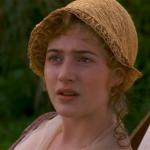
|
Marianne Dashwood "Marianne's abilities were in many respects quite equal to Elinor's. She was sensible and clever; but eager in everything: her sorrows, her joys, could have no moderation. She was generous, amiable, interesting: she was everything but prudent. The resemblance between her and her mother was strikingly great. Elinor saw with concern the excess of her sister's sensibility, but by Mrs. Dashwood it was valued and cherished. They encouraged each other now in the violence of their affliction." Romantic and hardly sensible, "Marianne, with excellent abilities and an excellent disposition, was neither reasonable nor candid. She expected from other people the same opinions and feelings as her own, and she judged of their motives by the immediate effect of their actions on herself." |
|
|
Margaret Dashwood "Margaret, the other sister, was a good-humored, well-disposed girl; but as she had already imbibed a good deal of Marianne's romance, without having much of her sense, she did not, at thirteen, bid fair to equal her sisters at a more advanced period of life." |

|
Edward Ferrars Fanny's brother was "a gentlemanlike and pleasing young man" "He was not handsome, and his manners required intimacy to make them pleasing. He was too diffident to do justice to himself; but when his natural shyness was overcome, his behaviour gave every indication of an open, affectionate heart. His understanding was good, and his education had given it solid improvement. But he was neither fitted by abilities nor disposition to answer the wishes of his mother and sister, who longed to see him distinguished- as- they hardly knew what. They wanted him to make a fine figure in the world in some manner or other. His mother wished to interest him in political concerns, to get him into parliament, or to see him connected with some of the great men of the day. Mrs. John Dashwood wished it likewise; but in the meanwhile, till one of these superior blessings could be attained, it would have quieted her ambition to see him driving a barouche. But Edward had no turn for great men or barouches. All his wishes centered in domestic comfort and the quiet of private life." A sensible, quiet young man can not help pleasing Mrs. Dashwood in the time of her sorrow and through knowing more of him, gain the affections of Elinor. |
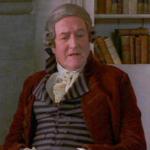
|
Sir John Middleton Mrs. Dashwood's cousin "was a good looking man about forty," and "very chatty." He offers his fair cousins a cottage on his estate of Barton Park in Devonshire. Mrs. Dashwood readily accepts though it means taking Elinor away from Edward. The find the Middleton's to be very friendly, good neighbors. "His countenance was thoroughly good-humoured; and his manners were as friendly as the style of his letter. Their arrival seemed to afford him real satisfaction, and their comfort to be an object of real solicitude to him." Sir John enjoys hunting, fishing, throwing impromptu parties and seeing young people dance at them, much to the chagrin of his elegant wife. |
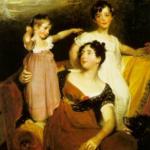
|
Lady Middleton & Children Sir John's wife, "was not more than six or seven and twenty; her face was handsome, her figure tall and striking, and her address graceful. Her manners had all the elegance which her husband's wanted. But they would have been improved by some share of his frankness and warmth; and her visit was long enough to detract something from their first admiration, by showing that, though perfectly well-bred, she was reserved, cold, and had nothing to say for herself beyond the most common-place inquiry or remark." She tolerates her husband's fanciful nature and takes pleasure in her children and household. "Lady Middleton piqued herself upon the elegance of her table, and of all her domestic arrangements; and from this kind of vanity was her greatest enjoyment in any of their parties." |
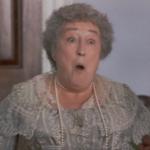
|
Mrs. Jennings "Mrs. Jennings, Lady Middleton's mother, was a good-humoured, merry, fat, elderly woman, who talked a great deal, seemed very happy, and rather vulgar. She was full of jokes and laughter." "Mrs. Jennings was a widow with an ample jointure. She had only two daughters, both of whom she had lived to see respectably married, and she had now, therefore, nothing to do but to marry all the rest of the world. In the promotion of this object she was zealously active, as far as her ability reached." The poor unmarried Miss Dashwoods! |
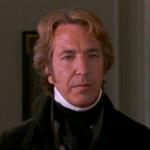
|
Colonel Brandon Sir John's old and intimate army friend. "He was silent and grave. His appearance, however, was not unpleasing, in spite of his being, in the opinion of Marianne and Margaret, an absolute old bachelor, for he was on the wrong side of five-and-thirty; but though his face was not handsome, his countenance was sensible, and his address was particularly gentlemanlike." Elinor liked the Colonel and saw with surprise his partiality for her sister Marianne. "His manners, though serious, were mild; and his reserve appeared rather the result of some oppression of spirits than of any natural gloominess of temper." |

|
Mr. Willoughby "Willoughby was a young man of good abilities, quick imagination, lively spirits, and open, affectionate manners." Marianne is rescued from the tragedy of a sprained ankle by this fine gentleman with "a manner so frank and so graceful that his person, which was uncommonly handsome, received additional charms from his voice and expression." Marianne decides he is her ultimate hero, especially "when she saw that to the perfect good breeding of the gentleman, he united frankness and vivacity, and above all, when she heard him declare that of music and dancing he was passionately fond." He seems to be all that a young man ought to be and soon gains the affections of Mrs. Dashwood and her daughters, though Elinor could believe that he is too perfect. |
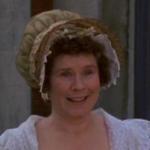
|
Charlotte Palmer The younger daughter of Mrs. Jennings and sister to Lady Middleton who comes to visit her sister and mother at Barton. "Mrs. Palmer was several years younger than Lady Middleton, and totally unlike her in every respect. She was short and plump, had a very pretty face, and the finest expression of good humour in it that could possibly be. Her manners were by no means so elegant as her sister's, but they were much more prepossessing. She came in with a smile, smiled all the time of her visit, except when she laughed, and smiled when she went away." |
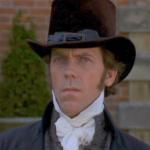
|
Mr. Palmer "Her husband was a grave looking young man of five or six and twenty, with an air of more fashion and sense than his wife, but of less willingness to please or be pleased. He entered the room with a look of self-consequence, slightly bowed to the ladies, without speaking a word, and, after briefly surveying them and their apartments, took up a newspaper from the table and continued to read it as long as he staid." What a strange contrast to his wife, one wonders how on earth they ended up married. "You and I, Sir John," said Mrs. Jennings, "should not stand upon such ceremony." "Then you would be very ill-bred," cried Mr. Palmer. "My love, you contradict everybody," said his wife with her usual laugh. "Do you know that you are quite rude?" "I did not know I contradicted anybody in calling your mother ill-bred." "Aye, you may abuse me as you please," said the good-natured old lady, "you have taken Charlotte off my hands, and cannot give her back again. So there I have the whip hand of you." Charlotte laughed heartily to think that her husband could not get rid of her, and exultingly said, she did not care how cross he was to her, as they must live together. It was impossible for any one to be more thoroughly good-natured or more determined to be happy than Mrs. Palmer. The studied indifference, insolence, and discontent of her husband gave her no pain: and when he scolded or abused her, she was highly diverted. "Mr. Palmer is so droll!" said she, in a whisper, to Elinor. "He is always out of humour." |
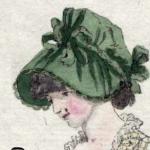
|
Miss Anne Steele Miss Anne Steele, cousin of Mrs. Jennings " the eldest, who was nearly thirty, with a very plain and not a sensible face, nothing to admire." "The vulgar freedom and folly of the eldest left her no recommendation." "No, no; they were shut up in the drawing-room together, and all I heard was only by listening at the door." "How!" cried Elinor; "have you been repeating to me what you only learnt yourself by listening at the door? I am sorry I did not know it before; for I certainly would not have suffered you to give me particulars of a conversation which you ought not to have known yourself. How could you behave so unfairly by your sister?" "Oh, la! there is nothing in that . I only stood at the door, and heard what I could. And I am sure Lucy would have done just the same by me; for a year or two back, when Martha Sharpe and I had so many secrets together, she never made any bones of hiding in a closet, or behind a chimney-board, on purpose to hear what we said." |
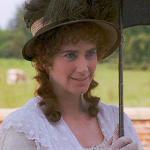
|
Miss Lucy Steele Anne's younger sister "Lucy is monstrous pretty, and so good humoured and agreeable!" Mrs. Jennings and Sir John are quite taken with their cousin and Lady Middleton admires them for the attentions they pay her children. Lucy "who was not more than two or three and twenty, they acknowledged considerable beauty: her features were pretty, and she had a sharp quick eye, and a smartness of air, which, though it did not give actual elegance or grace, gave distinction to her person. Their manners were particularly civil." The Miss Dashwoods however are not so taken with them "and as Elinor was not blinded by the beauty, or the shrewd look of the youngest, to her want of real elegance and artlessness, she left the house without any wish of knowing them better." Elinor soon finds that the Miss Steeles were nieces of Mr. Pratt, Edward's former teacher, she also learns from Lucy's own lips news that will destroy her own desires: "We have been engaged these four years." "Lucy was naturally clever; her remarks were often just and amusing" |
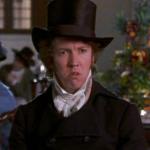
|
Mr. Robert Ferrars The younger brother of Edward Ferrars and Fanny Dashwood. "But Edward had no turn for great men or barouches. All his wishes centered in domestic comfort and the quiet of private life. Fortunately he had a younger brother (Robert) who was more promising." "Do you know Mr. Robert Ferrars?" asked Elinor. "Not at all- I never saw him; but I fancy he is very unlike his brother- silly, and a great coxcomb." |
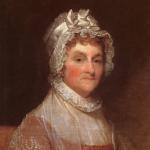
|
Mrs. Ferrars The mother of Edward, Robert, and Fanny: "Mrs. Ferrars's resolution that both her sons should marry well" Elinor has heard of her as "a very headstrong, proud woman" and has a desire to see her but one evening with her was certainly enough! "Elinor's curiosity to see Mrs. Ferrars was satisfied. She had found in her everything that could tend to make a farther connection between the families undesirable. She had seen enough of her pride, her meanness, and her determined prejudice against herself, to comprehend all the difficulties that must have perplexed the engagement, and retarded the marriage of Edward and herself, had he been otherwise free;" |
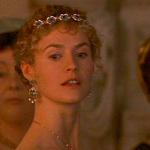
|
Miss Grey " 'Aye, it is but too true. He is to be married very soon -- a good-for-nothing fellow! I have no patience with him. Mrs. Taylor told me of it half an hour ago, and she was told it by a particular friend of Miss Grey herself. Well, said I, all I can say is, that if it is true, he has used a young lady of my acquaintance abominably ill, and I wish with all my soul his wife may plague his heart out.' 'The lady then -- Miss Grey I think you called her -- is very rich?' 'Fifty thousand pounds, my dear. Did you ever see her? a smart, stylish girl they say, but not handsome. But the family are all rich together. Fifty thousand pounds! and by all accounts it won't come before it's wanted; for they say he is all to pieces.' 'Do you know what kind of a girl Miss Grey is? Is she said to be amiable?' 'I never heard any harm of her; indeed I hardly ever heard her mentioned; except that Mrs. Taylor did say this morning, that one day Miss Walker hinted to her, that she believed Mr. and Mrs. Ellison would not be sorry to have Miss Grey married, for she and Mrs. Ellison could never agree.' 'And who are the Ellisons?' 'Her guardians, my dear. But now she is of age and may choose for herself; and a pretty choice she has made!' " |
| Grand Entrance |
The Library |
The Ballroom |
The Parlor |
Dining Room |
Elizabeth's Room |
Anne's Room |
Sir Walter |
The Gardens |
Jane Austen |
Site Map |